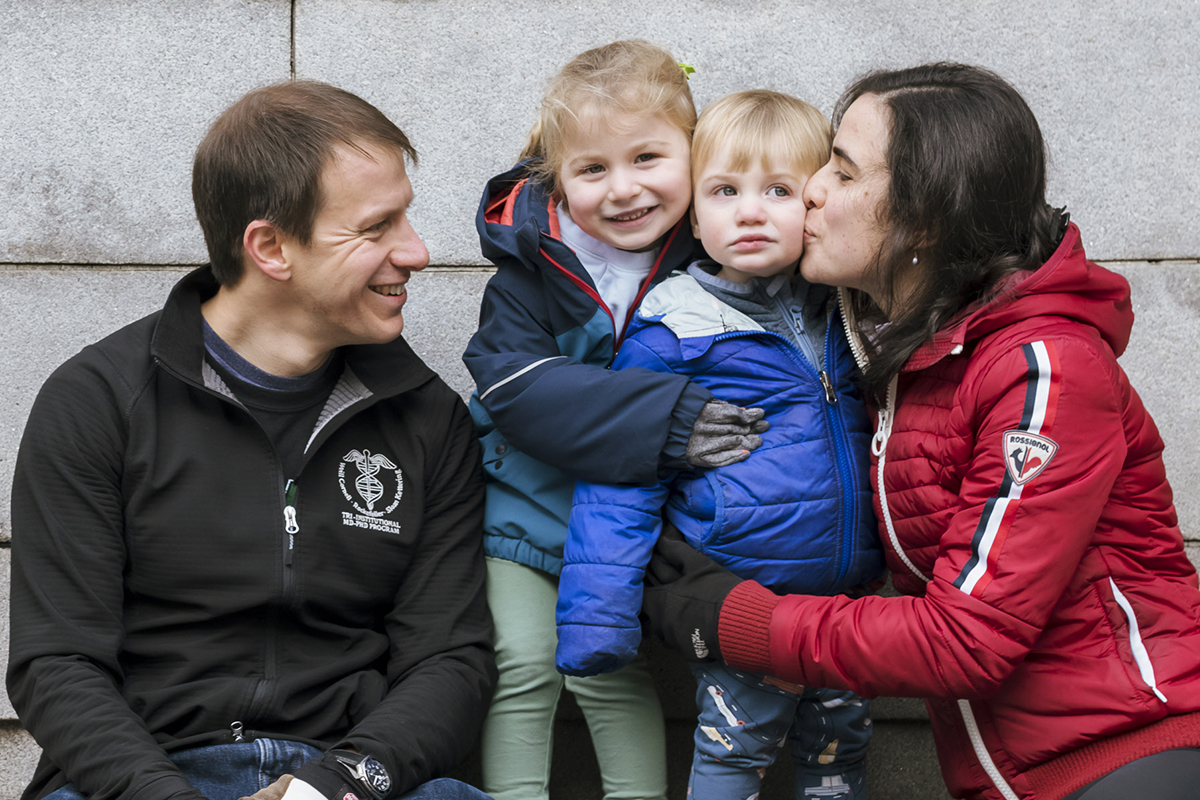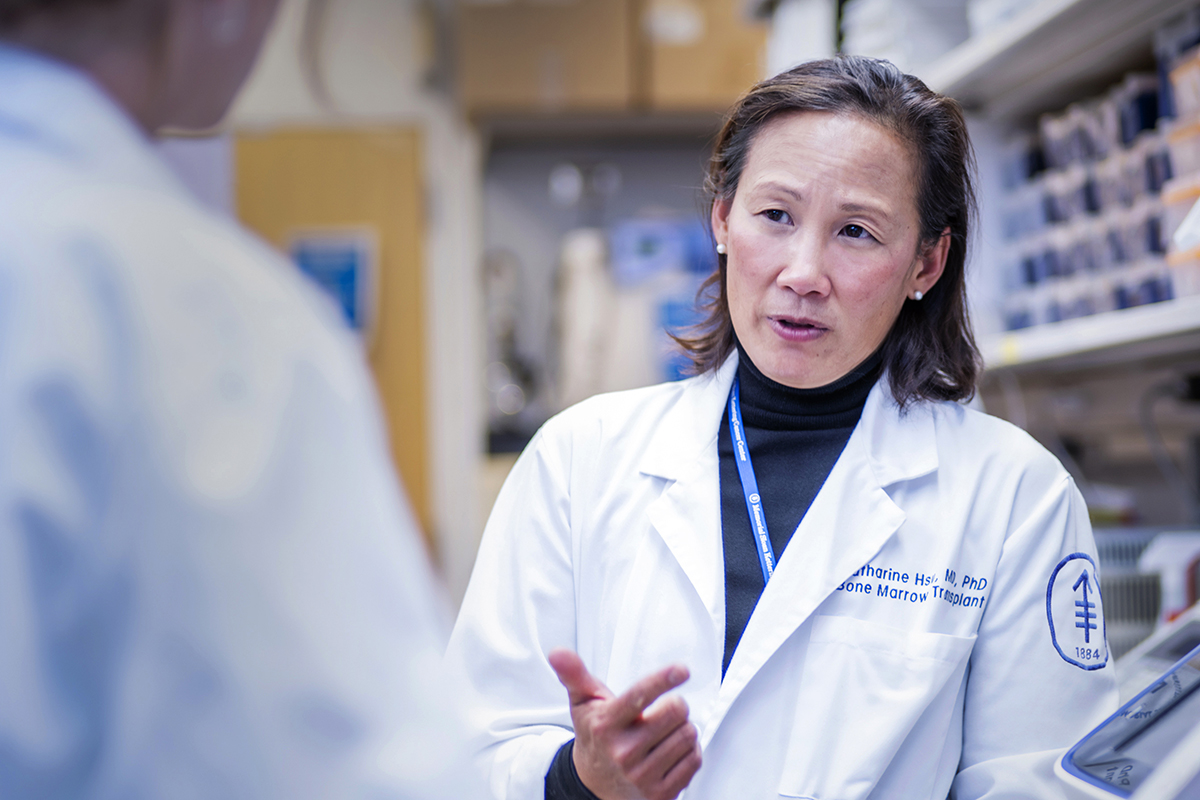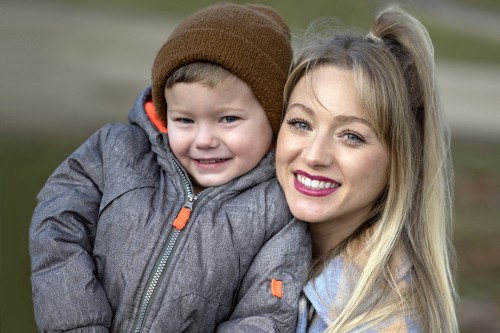
Susan De Wolf’s sneakers beat a rhythm against the pavement. As she winds her way through Manhattan’s Central Park, this is a creative moment for her, a reflective moment. A precious moment of calm and focus.
On this fall morning, Dr. De Wolf, a physician-scientist at Memorial Sloan Kettering Cancer Center (MSK), is writing a response in her head to the reviewers of a journal article she recently submitted for publication. Other outings might find her mapping out a new set of laboratory experiments or looking forward to sharing good news with a patient.
“I’m a pretty avid runner,” she says. “That time in the mornings or evenings is often when I get organized and think about what I need to do next.”
Researching Cancer and Treating Patients, Too
With one foot in the clinic and one foot in the lab, Dr. De Wolf must bring a runner’s balance to every part of her life. As an Assistant Attending Physician, she treats patients in MSK’s Leukemia Service. She’s also an active member of the lab of Marcel van den Brink, MD, PhD, the Alan N. Houghton Chair, where she is pursuing answers to thorny questions about blood cancers and how to better rally the body’s immune defenders against them.
“People who decide to become physician-scientists are really a special group of individuals,” says Katharine Hsu, MD, PhD, a physician-scientist at MSK who directs the Tri-Institutional MD-PhD Program, or Tri-I, that unites Weill Cornell Medicine, The Rockefeller University, and MSK. “They’re not only interested in providing each individual patient with the best possible care — they’re passionate about pursuing research to understand why illness occurs and how we can better prevent and treat it.”

And the many demands on physician-scientists’ time and energy don’t end at the clinic or laboratory doors. Dr. De Wolf is also enmeshed in a vibrant family life, raising two young children with her husband, an equally busy physician-scientist pursuing a fellowship in pediatric endocrinology at nearby Columbia University.
“My kids are amazing, and I adore spending time with them,” she says. “We love to explore New York City on foot and by bike. My husband has a bike that can carry both kids on the back.”
MSK Support for Physician-Scientists Starting Out
MSK is helping to support Dr. De Wolf and other early career physician-scientists with resources and mentorship to launch careers in the face of the unique challenges that come with juggling the rigors of clinical care and laboratory research.
“There isn’t a single, linear path for physician-scientists,” Dr. De Wolf says. “You have to be truly excited about living in both worlds.”
Dr. De Wolf was named to the first cohort of Louis V. Gerstner, Jr. Physician Scholars — made possible by a $25 million gift from Gerstner, a long-serving member of MSK’s Board of Trustees and the Chairman of the Board of MSK’s Gerstner Sloan Kettering Graduate School of Biomedical Sciences.
“The development of the Gerstner Physician Scholars Program is critically important to address the shortfall of cancer subspecialists who are highly trained as experts in both clinical care and scientific research, and who can translate their findings from the bench to the bedside, and back,” says Monika Shah, MD, Deputy Physician-in-Chief of Education and Faculty Affairs at MSK.
Funding that Dr. De Wolf receives through the program helps pay her salary and support her research projects — allowing her the time to develop the preliminary data necessary to win larger competitive grants from external sources like the National Institutes of Health, an important step in kick-starting an independent career.
Dr. De Wolf says the mentorship she’s received from Dr. van den Brink has been invaluable. And, likewise, he’s excited to help foster her career.
“Susan represents the next generation of very intelligent, well-trained, highly motivated physician-scientists, who excel both at the bedside and the bench,” Dr. van den Brink says. “Physician-scientists are more than ever ideally positioned to perform groundbreaking research and translate this into novel lifesaving therapies.”
Using Research Knowledge To Treat Leukemia
The questions Dr. De Wolf is trying to answer in the lab are ambitious, while seeing patients in the clinic serves as a reminder of how her benchwork matters on a human scale.
“Right now, a bone marrow transplant is the only curative treatment we have for acute myeloid leukemia and myelodysplastic syndromes, or MDS,” she says. “And we know that T cells are really important for eradicating leukemia in the transplant setting. But when it comes to immunotherapy, we haven’t figured out how to get your own T cells to work against your leukemia or MDS. Figuring out why is what I want my career to be about.”
Steeped in the nuances of the biology down to the genetic and mechanistic levels, and aware of how each different treatment approach works, Dr. De Wolf says the best part of her job is where these two worlds overlap.
“The coolest part is when I’ve been taking care of a patient and they’ve allowed us to do research on samples taken from them,” she says. “To be able to see their leukemia, see their T cells, and strive to truly understand what’s going on at a deep, deep level so that we can take what we’re learning to try to help them and help other patients — that’s the best.”
Training for the Next Generation of Physician-Scientists
As Dr. De Wolf emphasizes, there are numerous paths that bring aspiring physician-scientists to MSK. Among them, more than 600 applicants apply to the Tri-I MD-PhD program each year, competing for fewer than 20 positions, which are fully funded from start to finish. The commitment required of both applicants and institutions isn’t small — trainees spend an average of 8.4 years in the program, after which they will go on to do several additional years of medical training.

“The combined MD-PhD training creates a whole that’s greater than the sum of its parts,” says Dr. Hsu, herself a graduate of Tri-I. “Medical training is pretty straightforward. It covers a broad range of topics, though to a relatively shallow degree. In contrast, pursuing a PhD means understanding one very narrow topic extremely deeply, but it also trains you to think differently and more mechanistically about the things you encounter in the clinical setting.”
The program also nurtures students through the challenging transitions between medical school, the lab, and back again.
Not only is the Tri-I MD-PhD program one of the oldest and largest in the country, but it is also unique in offering access to more than 280 laboratories across the three institutions, as well as to world-renowned hospitals and specialty care centers.
Leaders at Tri-I and MSK also understand the importance of fostering the next generation of physician-scientists, including pathway-building programs to help more undergraduate students obtain fundamental laboratory experience — particularly those from backgrounds and communities that are underrepresented in the sciences.
“Even if you have somebody who’s very confident they want to be a physician-scientist, if they haven’t demonstrated that they know what commitment and resilience is required to be successful in the laboratory, they’re not going to be selected,” Dr. Hsu says.
Dr. De Wolf, too, speaks of how formative her early experiences in the lab were — starting with a middle school science teacher who helped her land a summer gig wrangling nematode experiments in the lab of future Nobel Prize winner Martin Chalfie, PhD, and continuing through medical school to the present day.
“I had this amazing postdoctoral mentor that first summer who taught me how cool it was to be in the lab, and I basically spent the rest of my schooling finding ways to spend time in the lab,” she says. “Having one foot in the lab and one in clinical medicine is something that’s been part of who I am since I was a first-year medical student — and that would have never happened without a lot of generous support and mentorship along the way.”
Also Among the First Gerstner Scholars
- Morgan Freret, MD, PhD, a radiation oncology resident who researches leptomeningeal metastasis
- Juan Osorio, MD, a medical oncologist who focuses on the treatment of gynecologic cancers
- Samir Zaidi, MD, PhD, a medical oncologist who specializes in the care of genitourinary malignancies
